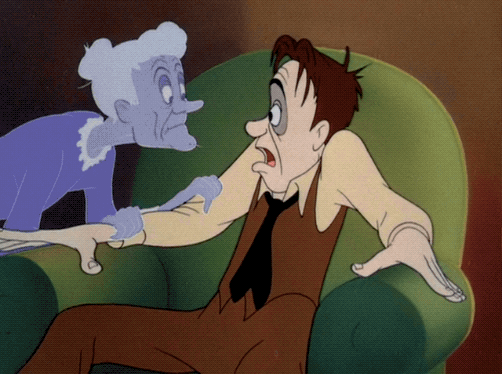A Year in Shorts Day 300: "Reason and Emotion"
Pixar’s Inside Out was, for my money, one of the best films of 2015, really only edged out for the top spot by Mad Max: Fury Road. Of course, like all films, it had its share of critics, some more serious than theirs. One of the sillier critiques people liked to make was noting the similarities the film shared with the sitcom Herman’s Head, joking that Disney ripped off the concept. Of course, had they known their film history, they would have remembered that Disney properly laid claim to the concept of emotions piloting people’s brains in 1943, with the World War II propaganda cartoon, Reason and Emotion.
Directed by Bill Roberts, Reason and Emotion is certainly one of the more interesting propaganda shorts we've looked at. For one thing, it's not even a little racist. For another, it doesn't even seem like a propaganda short at first. Instead, the film begins as an introduction to the concepts of Reason and Emotion (hey, that's the name of the film!) as they battle for control over the human mind. It's this concept which sets Reason and Emotion apart from the rest of the pack, using its clever conceit to both entertain and educate. Emotion, who is basically Danny DeVito but as a caveman, craves excitement and danger. (He is also, according to IMDb, voiced by Mel Blanc, although I can't find any sources to corroborate that, so I remain skeptical.) But Reason, who is basically just Niles Crane without the neuroses, is keeping tight control of the driver's seat. With the helpful narration from Frank Graham, the film demonstrates the dangers of letting our emotions get the better of us- with a man getting slapped for sexually harassing a woman, who then proceeds to overindulge at a restaurant and ruin her figure. (Look, I said that short wasn't racist, I never said anything about it not being sexist.) The opening four minutes do an excellent job of establishing the short's premise, and are perfectly entertaining on their own. It's really no wonder Pete Docter cited the film as one of his inspirations for Inside Out.
It isn't until the halfway point that the film's main purpose is revealed, as an everyman by the name of John Doakes is beset on all sides by fear-mongering sensationalist media. As he's bombarded by bad news on all sides, Doakes' emotion nearly gets the better of him, which the narrator informs us is perfectly fine- for Hitler! (Insert scare chord.) What follows is the bread-and-butter of the short, as the narrator explains how Hitler obliterated reason and preyed on the emotions of the German people to gain power and inspire loyalty. The solution, therefore, is to not let your emotions take over, but use reason to power through, using your emotions as an aid instead of the driving force. And you know what? That's not a bad message to send at all. In fact, as far as critiques of fascism go, it's more accurate than most. Compare this short's point to the climactic speech in The Great Dictator, which had the opposite message, painting fascism as a cold, unfeeling machine which values logic over feeling. While that sentiment might be easier to digest (and certainly fits in better with Chaplin's style), it's simply not true. As we've seen far too often these past few years, there's very little logical about fascism, and it's important to acknowledge that. It's a little ironic, considering the amount of propaganda shorts we've seen (including those produced by Disney!), which played into people's fears, national pride and racial prejudices to make their point, to have one which urges reason above all else. If that were the only thing this short had going for it, it would still make it better than a lot of those shorts.
But luckily, I can recommend Reason and Emotion for reasons beyond its good (and, sadly, timeless) message. While it may not be as good as Der Fuehrer's Face or Blitz Wolf, it's nevertheless pretty entertaining. It may be more clever than funny, but in the grand scheme of things, there are worse things to be than merely clever. And while some parts of the animation might be a little off-putting (you all know how I feel about cartoon babies, and the more realistic portraits are creepy), for the most part it's up to the usual Disney standard. I'm especially fond of the animation for Hitler (boy, there's a sentence you never expect to say), in which the animators clearly felt free to go wild in exaggerating the various emotions. But honestly, the whole short is filled with bits like that, with its creative transitions and character designs. (Not to mention the requisite amount of physical violence.) It's clear that the animators were experimenting a lot in this one, and that certainly keeps things interesting. When you take all that and combine it with a pretty great concept, you've got a recipe for an above average piece of World War II propaganda. Which might not be saying much, but it's something.
At the end of the day, a propaganda short is still a propaganda short, complete with all the same pitfalls and problematic elements that come with that. And yes, in some ways, Reason and Emotion has not aged particularly well. The same can be said for most pieces of World War II propaganda. But unlike many of those films, books, songs and posters, there are plenty of ways in which Reason and Emotion has withstood the test of time. It may not be the best short of its kind we've looked at, but it might be the most relevant.
Keep up with the Oscar Baiting here on Letterboxd!
The Great Oscar Baiter is a not-for-profit work of criticism. All images herein are property of their respective owners and are protected under Fair Use.



Comments
Post a Comment